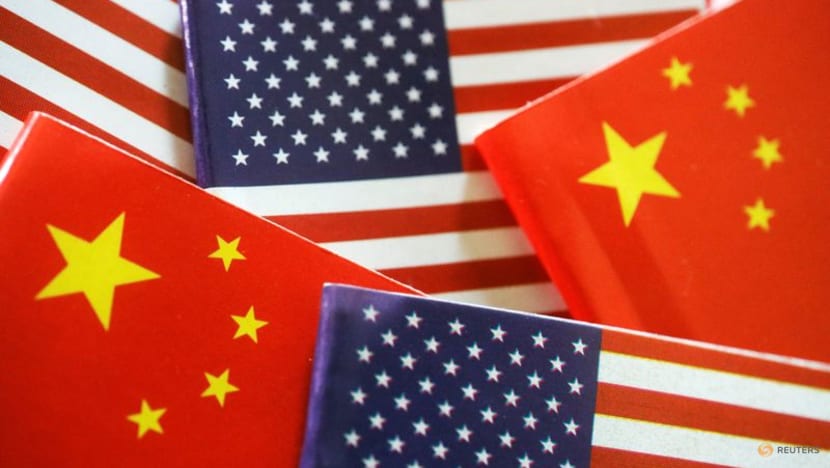US government worker, target of exit ban, prevented from leaving China for months: Reports
The Washington Post and South China Morning Post reported on the same case, saying the man was reportedly held on national security grounds and had failed to disclose that he worked for the US government on his visa application.

Flags of US and China are seen in this illustration picture taken on Aug 2, 2022. (File photo: Reuters/Florence Lo)

This audio is generated by an AI tool.
An American citizen who works for the US government has been blocked from leaving China for months, possibly on national security grounds, after travelling there recently, the South China Morning Post has learned.
A source familiar with the matter said that a naturalised US citizen, originally from China, was detained by authorities upon landing in Chengdu, Sichuan Province, in April.
The exact reason for the exit ban, as these restrictions are typically known, could not be confirmed, though the source said it related to actions Beijing deemed harmful to national security.
The Washington Post, reporting on the same incident and citing people familiar, said the employee was being held for failing to disclose on his visa application that he worked for the US government.
The individual, who previously served in the US Army, works for the US Commerce Department’s Patent and Trademark Office, but he had been on a personal trip to visit relatives. His wife is believed to live in the US.
The Post is withholding his name out of concern for his safety and privacy while he remains in China.
Since being held in Chengdu, he has travelled to Beijing, accompanied by a US official, though his current whereabouts are unknown. At one point, according to the source, the individual’s US passport was taken from him, but it has since been returned.
In a statement on Sunday (Jul 20), the State Department said it has “nothing to share” regarding the case, adding that its “highest priority is the safety and security of US citizens”.
Neither the Commerce Department nor the Chinese embassy in Washington immediately responded to a request for comment.
Beijing has in recent years imposed travel restrictions on both Chinese and foreigners. According to the Exit and Entry Administration Law of the People’s Republic of China, foreign nationals can be barred from leaving China if they are involved in unsettled civil cases or under criminal investigation or trial.
They may also be subject to on-the-spot interrogation if they are suspected of endangering national security or disrupting public order.
Western officials and human rights groups have criticised the arbitrary enforcement of exit bans.
Most reported bans are not imposed on individuals accused of crimes, but rather on those involved in civil litigation. This marks the first publicly known case of a US government-affiliated individual being targeted.
Exit bans can remain in place for months or even years as the underlying investigations stretch on. Often the target is unaware that they are subject to a ban until they try to leave China.
“These happen with business people relatively routinely,” said Dennis Wilder, a senior fellow for the Initiative for US-China Dialogue on Global Issues at Georgetown University, noting that sometimes they concern “legitimate business disputes”.
Wilder, who was the CIA’s deputy assistant director for East Asia and the Pacific from 2015 to 2016, said that all exit ban cases concerning Americans he was aware of involved individuals of Chinese descent. But he said he had never come across a case involving someone who worked for the US government.
While no specific charge is known to have been brought against the individual, Wilder said that it would be unlikely for someone working at the Commerce Department to be engaged in intelligence-gathering operations. “That doesn’t fit any model,” he said.
Earlier this week, The Wall Street Journal first reported that a Wells Fargo executive of Chinese descent was banned from leaving the country; the US bank has since suspended travel to China.
The use of such measures on foreign businesspeople has heightened concerns about business travel to mainland China in recent years. Some companies have cancelled or delayed trips, while others have implemented safeguards and advised employees to travel in groups rather than alone.
Sometimes targeted individuals have no direct role in the underlying legal dispute. In 2018, two Americans, Cynthia and Victor Liu, the children of a former executive at a Chinese state-owned bank accused of fraud, were prevented from leaving China in a move that their lawyers said was designed to pressure their estranged father to cooperate with police.

Their release in 2021 came hours after a US fraud case against Huawei Technologies executive Meng Wanzhou was resolved, allowing her to leave Canada, where she was under house arrest, and fly to China.
Comprehensive data on exit bans is not readily available.
A 2022 study by two academics at California Polytechnic State University found 128 cases of foreign nationals hit with exit bans between 1995 and 2019, including 29 Americans and 44 Canadians. Around a third of the bans were business-related. Many cases lacked sufficient detail to determine their nature.
During the Joe Biden administration, the State Department said it could not provide a full count of Americans under exit bans. Some cases go unreported, as affected individuals and their families fear that disclosure could hinder efforts to have the bans lifted.
When families do reach out, they typically want quiet assistance, according to Wilder: “Usually they really are very concerned about publicity because they’re business people, and they’re planning to do more business in China.”
Wilder, who was involved in the case of the Liu siblings, said such situations are typically resolved only when senior administration officials intervene. For the Liu case, Wilder said, the US government was reluctant to get involved – “partially because these are messy”.
Official discussions related to the Commerce Department employee have been held, according to the Post’s source.
Beijing’s use of exit bans has been a flashpoint in the US-China relationship.
In November, the Biden administration eased the travel warning it had placed on China after Beijing released three Americans previously under detention in an apparent prisoner swap.
While the National Security Council then noted there were no longer Americans “wrongfully detained” in China, the State Department stressed they were still subject to “arbitrary enforcement” of exit bans – a factor it cited in issuing a level 2 travel advisory, which urges Americans to “exercise increased caution”.
The advisory for China remains at level 2 today, down from level 3, which had urged Americans to “reconsider travel”.
China recorded nearly 65 million border crossings by foreign nationals in 2024, according to its National Immigration Administration.
For their part, Chinese authorities in recent years have accused the US of unfairly targeting Chinese nationals at border crossings.
This article was first published on SCMP.

















